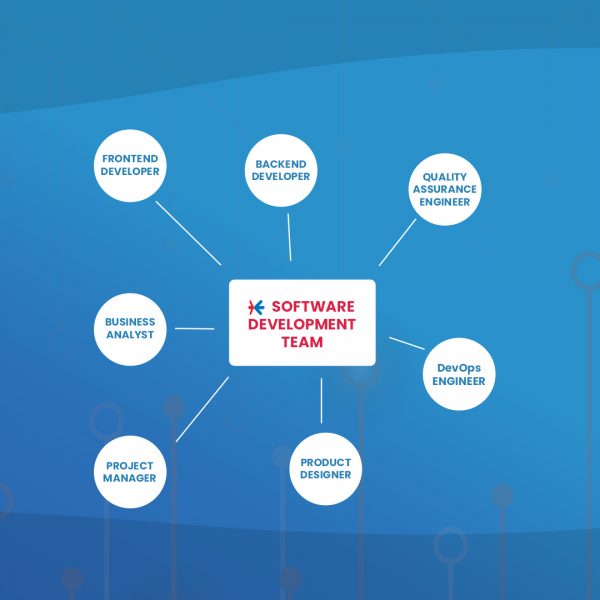Software projects are challenging and require careful preparation, a talented development team, and cooperation among project team members, both internally and externally. Identifying and documenting the software project roles and responsibilities is one of the keys to a successful software project. Without a proper organizational framework, even Elon Musk wouldn’t be able to do it all by himself!
We identified 7 roles in a software project:
- Frontend Developer
- Backend Developer
- Quality Assurance Engineer
- DevOps Engineer
- Product Designer
- Project Manager
- Business Analyst
Frontend Developer
The frontend developer is responsible for everything the users see. They ensure that the users have a seamless experience that is free of lags. Your frontend developers’ abilities determine the consistency of almost all your user interacts with, like texts, keys, navigation bars and animations. The most difficult aspect of their role is ensuring that every user has the same experience, regardless of whether they use Edge or Chrome, a computer or a tablet, Android or iOS. It’s a huge task, considering how many browsers, tablets, smartwatches, and other smart-stuff we use. Frontend developers charm browsers and master resolutions for an enhanced digital experience.
Backend Developer
Backend developers could be called „Chief Technological Problem Solvers”. All the magic happens under the hood thanks to the individuals who writes complex and sophisticated algorithms and application logic.
Backend developers ensure that the product not only looks great, but also runs smoothly and efficiently. They design and build the whole application infrastructure, deciding which services and databases should interact with one another, how API and external integrations should operate, and how to keep the product safe and stable.
Quality Assurance Engineer
Software development is a dynamic and error-prone field, and even the most experienced software developer would not be able to implement perfect solutions on their own. This is why having a Quality Assurance Engineer on board can be beneficial to any software development team.
Simply put, the responsibilities of QAs are they detect bugs and issues before the users do. QA specialists pay close attention to consistency, protection, usability, and the appearance of your application from the end-user’s perspective when testing it. They are more than just testers; they also ensure that implemented features follow the specifications (which they helped to define beforehand), write documentation, build test cases, and actively contribute to the project’s best development practices. Their contribution is crucial in providing a high-quality product, a smooth end-user experience, and meeting project objectives.
DevOps Engineer
So your team has produced a cutting-edge program, you asked a group of friends to try it out, and they fell in love with it right away. You’re ready to show the world your new creation; all you have to do now is release the app and watch your bank account burst with cash. Isn’t there anything that could possibly go wrong? You discover an hour after releasing the app that it is five times slower than when you checked it, that people from other countries require ten seconds to load the main page and that the app has already crashed six times in 20 minutes.
Solving the above issues is a job for DevOps Engineers, an infrastructure commando who isn’t afraid of new challenges. It is their responsibility to upgrade the infrastructure. Your DevOps Engineer ensures that your app is easy, stable, and accessible to people all over the world. Your app must be able to manage large increases in user behavior without being overburdened, and it must remain online even though the entire server warehouse is on fire.
Product Designer
You may have heard them referred to as UX designers, UI designers and a variety of other words. They are needed and critical to the success of the product you create. People also think of them as graphic designers who make attractive designs. Product Designers ensure the application’s feel and look, as well as the overall user experience, are as sharp and appealing as possible. Also, they’ll be a part of your team during the entire development process, from translating your business goals into usable user experiences to analyzing, reviewing,implementing and enhancing those experiences over time.
Also, they are data masters: they notice any shift in conversion rates, click rates, and other metrics, draw conclusions, and recommend strategies to ensure that the metrics support your business goals.
Project Manager
Project managers keep projects on track. PMs have a difficult task in the world of software development, as they need to ensure that the team is engaged and productive, that risks are detected and controlled, and that the highest production and communication standards are adhered to.
A project manager also serves as a link between IT and business, and is commonly the first point of contact or escalation for clients.
Their domain-specific expertise provides efficient management of the project scope, and is essential in ensuring that the key targets of cost, time, and quality can be realised. Having effective project management in your team helps you to concentrate on your product and market rather than keeping track of every last detail.
Business Analyst
The majority of products fail not because they were poorly built, but because they failed to meet the market expectations. A Business Analyst will help you prevent this by ensuring that you are building the right product at the right time to solve the right problem, and that it is consistent with your overall business model and client expectations. Devoting time and resources to market analysis increases the likelihood of project success significantly. A Business Analyst assists you in developing a product strategy and creating expectations based on the needs of your clients and stakeholders, as well as validating whether you are on the right track.


Social Media